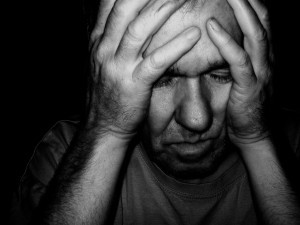Contributor: Bethany Winkel is a freelance writer for My Recovery Helper
 College can be a challenging time for anyone, but when something like a mental health disorder comes into play, the college experience can get much more difficult. A disorder like Post Traumatic Stress Disorder (PTSD) that causes anxiety and fear of social settings can lead an otherwise determined and well-rounded college student to get caught up with drugs or alcohol.
College can be a challenging time for anyone, but when something like a mental health disorder comes into play, the college experience can get much more difficult. A disorder like Post Traumatic Stress Disorder (PTSD) that causes anxiety and fear of social settings can lead an otherwise determined and well-rounded college student to get caught up with drugs or alcohol.
Causes of PTSD
Post Traumatic Stress Disorder is a psychological condition that results when a person experiences a traumatic or stressful event. The event can be something as obvious as being deployed to combat in the military or being threatened physically during a robbery or accident, or it can be as subtle as seeing some sort of real-life traumatic incident unfold on television. What is significant is how that event made the person feel, and how they react to the memory of it after the fact.
A condition like PTSD can have lasting effects on a person, even leading them to use drugs or alcohol to self-medicate. While this can be a problem for any demographic, college students are especially vulnerable to substance addiction that is related to a mental health issue like PTSD.
PTSD Causes Anxiety
 Someone who suffers from PTSD will feel shock, disbelief, confusion, anxiety, hopelessness, and self-blame over the event. They will obsess over the incident, recalling it frequently and re-experiencing the strong emotions from that time over and over. Even when the person tries to avoid thinking of the situation, they will have nightmares and flashbacks, which lead to insomnia, edginess, agitation, difficulty concentrating, and fatigue. Someone with PTSD will even have aches and pains, muscle tension, and racing heartbeat as a result of the flashbacks of the event or events. Their condition can be triggered by images, sounds, or other situations that remind them of the event which bring back painful memories.
Someone who suffers from PTSD will feel shock, disbelief, confusion, anxiety, hopelessness, and self-blame over the event. They will obsess over the incident, recalling it frequently and re-experiencing the strong emotions from that time over and over. Even when the person tries to avoid thinking of the situation, they will have nightmares and flashbacks, which lead to insomnia, edginess, agitation, difficulty concentrating, and fatigue. Someone with PTSD will even have aches and pains, muscle tension, and racing heartbeat as a result of the flashbacks of the event or events. Their condition can be triggered by images, sounds, or other situations that remind them of the event which bring back painful memories.
PTSD often causes the sufferer to have feelings of guilt, inadequacy, and failure, as they struggle to understand the emotions they are going through and lead a normal life again. A college student who has PTSD faces the challenge of fitting in with their peers, trying to keep their grades up, and hoping their mental health condition will not affect the rest of their life.
Avoiding the Temptation to Self-Medicate
 The problem with PTSD is that many people suffer in silence with this condition, not admitting to anyone that they are having the thoughts and feelings that they are. Instead, many choose to self-medicate with drugs or alcohol, and continue to sink deeper into depression and addiction. Substance use during this time only amplifies the situation, leading to many more problems.
The problem with PTSD is that many people suffer in silence with this condition, not admitting to anyone that they are having the thoughts and feelings that they are. Instead, many choose to self-medicate with drugs or alcohol, and continue to sink deeper into depression and addiction. Substance use during this time only amplifies the situation, leading to many more problems.
The college years are a time for someone to discover who they are, to become self-supporting, and to set their course for life. When those years are hindered by something as all-encompassing as PTSD, it becomes impossible for a person to be happy or have hope for the future. Drug or alcohol use can numb the mind and can stop the pain for a while. When a person with PTSD or any mental health condition uses drugs or alcohol to self-medicate, they feel better for a moment, but in the end they are worse off than when they started. Drug and alcohol abuse can quickly turn into dependence and addiction though, and then the person has to deal with their mental health disorder as well as substance addiction.
Recovering from PTSD
 Recovery is possible. PTSD can be effectively treated. The first thing the person should do is ask for help and not try to manage this condition on their own. The person should seek the help of a doctor who can establish a treatment plan, and then also enlist the help of others who can provide encouragement and support.
Recovery is possible. PTSD can be effectively treated. The first thing the person should do is ask for help and not try to manage this condition on their own. The person should seek the help of a doctor who can establish a treatment plan, and then also enlist the help of others who can provide encouragement and support.
If you are a college student struggling with a mental health disorder like PTSD, listen to the following advice:
- Don’t try to make yourself feel better by using drugs or alcohol. Turning to substances only makes the problem worse.
- Ask for support. Talk to a friend or family member about how you are feeling and what is going on.
- Surround yourself with other positive influences. Whether you join a support group or just make it a point to spend time with your peers, participating in social activities can help you in your recovery.
- Most importantly, get help. Consult your doctor about your concerns and be willing to see a psychologist or counselor if necessary.
Community Discussion – Share your thoughts!
Have you or your loved one struggled with PTSD? Was this an issue during college? Did you seek treatment or group support? What worked well for you?
About the author:
Bethany Winkel is a freelance writer for My Recovery Helper (http://www.myrecoveryhelper.com/), a referral service that connects individuals with the treatment program that is right for them. Bethany uses her work to help others learn the importance of finding help for addiction disorders.
The opinions and views of our guest contributors are shared to provide a broad perspective of addictions and co-occurring disorders. These are not necessarily the views of Addiction Hope, but an effort to offer a discussion of various issues by different concerned individuals. We at Addiction Hope understand that addictions result from a combination of environmental and genetic factors. If you or a loved one are suffering from an addiction, please know that there is hope for you, and seek immediate professional help.
Last Updated & Reviewed By: Jacquelyn Ekern, MS, LPC on September 18, 2015. Published on AddictionHope.com
